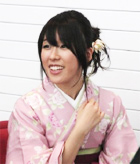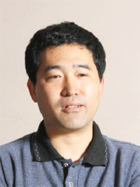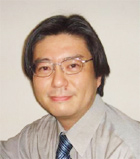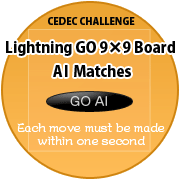TOP![]() Events
Events![]() CEDEC CHALLENGE
CEDEC CHALLENGE![]() Lightning GO 9×9 Board AI Matches
Lightning GO 9×9 Board AI Matches
CEDEC CHALLENGE
* All passes including EXPO PASS can access the CEDEC CHALLENGE.
Information on Lightning GO 9×9 Board AI Matches
in CEDEC CHALLENGE
CEDEC 2010 includes various competitive events collectively referred to as the "CEDEC CHALLENGE." The CEDEC CHALLENGE for programming features the game of Go where matches are held between two AI (artificial intelligence) programs. We are currently soliciting AI programs from the general public. The event is organized to improve video game development technologies and to promote the development of relevant human talents through competition.
General guidelines
The preliminary and final matches will be held from 8/31 to 9/2/2010 at the CEDEC 2010 in Pacifico Yokohama conference center. The top four programs short-listed in the preliminary rounds will advance to the tournament-style final matches. All source code and documentation for participating programs will be available to the general public on CEDEC's server.
General rules
The matches will be organized in the form of automatic pairings between Go AI programs running on two client PCs which are connected via the network to a match-up server (the Computer Go Forum "nngs"). The server and clients will be PCs (HP Elitebook 8540w Mobile Workstation / Core i5 540M/2GB RAM/250GB HDD) prepared by CEDEC.
The source code for the AI programs must be stored in advance on a predetermined file server in the form of buildable source code. Prior to a Go match, the source code will be downloaded to the client PCs and compiled by the Program Committee If a team's code does not compile they will lose the match.
All matches will take place on 9x9 boards, and each move must be made within one second. A match is considered to have ended when either of the programs does not make a move within one second or makes an illegal move.
Each match continues for up to two minutes. If a match does not end within this time limit, a judge determines the winner on the basis of the position on the board. A judge will formally determine the winner even when a match ends within the two minute time limit.
The Japanese rules of play will be used.
Program development environment
Through the cooperation of the Computer Go Forum, all entering competitors will be given access to the "nngs" server for program development. By using the server, participants can test programs by playing them against each other or against existing computer AI programs. The running development environment is limited to the Windows version of Cygwin 32-bit. Programming languages should be those included in the standard distribution of Cygwin (to use any other programming language, please consult with us). Each participant must eventually prepare a "makefile" and submit a package for use in the preliminary and final matches and for public disclosure; they should also submit the source codes, data, necessary libraries and processors, etc. The package must be buildable using only the "make" command and without the need for any special configuration by CEDEC Program Committee.
Entry period
From June 1 to July 31, 2010 (you can continue developing and uploading your programs until just before the start of CEDEC 2010).
Entry method
Please e-mail us at ![]() for detailed information and enquiries.
for detailed information and enquiries.
Entry fee for this challenge isFREE!
All entrants must, by 8/20 (Friday), submit their program packages to the server which is hosted by CEDEC. Only those programs validated by the CEDEC program committee will be allowed into the preliminaries. (If there are too many applicants, the committee will then further select which programs to allow.)
To participate in the preliminaries, please come to the reception desk at the conference hall on the morning of 8/31 (Tuesday, the first day of CEDEC). There, each entrant will be given a full conference pass. In the case of teams, up to three exhibition passes will be given for the other team members.
We sincerely look forward to your participation.
List of supporters of Lightning GO 9×9 Board AI Matches
WANG Wei jen, 4-dan Professional Go Player

Born in 1977 in Taiwan
Migrated to Japan at the age of 12
Completed his master's degree at the Graduate School of Oberlin University
Actively involved in promoting Go as a director of the Go promotion project "IGO AMIGO"
Instructor, Junior Go School, Nihon Ki-in
Instructor, Go Class conducted by Umezawa Yukari, WANG Wei jen, and Kana Mannami
Instructor, Open College, Oberlin University
Kana Mannami, 4-dan Professional Go Player

Born in 1983 in Hyogo
Won the Women’s Kisei title in 1994 and 1996
Actively involved in promoting Go as a representative director of the Go promotion project "IGO AMIGO"
Appeared on many TV programs, including the NHK Go Cup, where she was a moderator
Instructor, Go Class conducted by Umezawa Yukari, WANG Wei jen, and Kana Mannami
Younger sister Nao Mannami is also a 2-dan professional Go player.
Books
"Mannami Kana No IGO Nyumon" (Mannami Kana's Introduction to IGO) (Nitto Shoin)
"Mannami Shimai No Gungun Tsuyokunaru IGO Q&A" (Mannami Sister's Present—Q&A for Rapid Progress in Go) (Mainichi Communications)
"Sekai-ichi Yasashii Tesuji To Tsumego – Surasura Tokeru 318-Dai" (World's Easiest Go Moves and Go Matches—Easily Solving 318 Examples) (Mainichi Communications)
"Mannami Kana No IGO Jotatsu Handbook" (Mannami Kana’s Handbook for Mastering Go) (Mainichi Communications)
Masakazu Muramatsu, Professor

Doctor of Philosophy
Department of Informatics and Communication Engineering, The University of Electro-Communications
Born in 1965 in Tokyo
Majored in optimization theory and started research on computer Go around 2005
Planning and participating in events in which computers are pitted against professional players, such as the Go UEC Cups and FIT2008
Vice-chairman, Computer Go Forum (CGF)
Committee member, The Special Interest Group on Game Informatics, Information Processing Society of Japan
Takeshi Ito, Assistant Professor

Doctor of Engineering
Department of Informatics and Communication Engineering, The University of Electro-Communications
Born in 1964 in Aichi
Engaged in research on players' thought and cognitive processes such as learning, especially in the context of Go and Shogi, and on enjoyable match-up games. Also engaged with planning and implementing thought-based-game competitions such as the Computer Go The Third Computer Go UEC Cup and Minishogi competitions
Representative, Cognitive Science and Entertainment Research Station
President, Computer Shogi Association (CSA)
Director, Computer Go Forum (CGF)
(The above information is up-to-date as of May 28, 2010.)
In cooperation with IGO AMIGO, Computer Go Forum (CGF),
EIZO NANAO Corporation, Hewlett-Packard Japan, Ltd.
and Mainichi Communications Inc.


